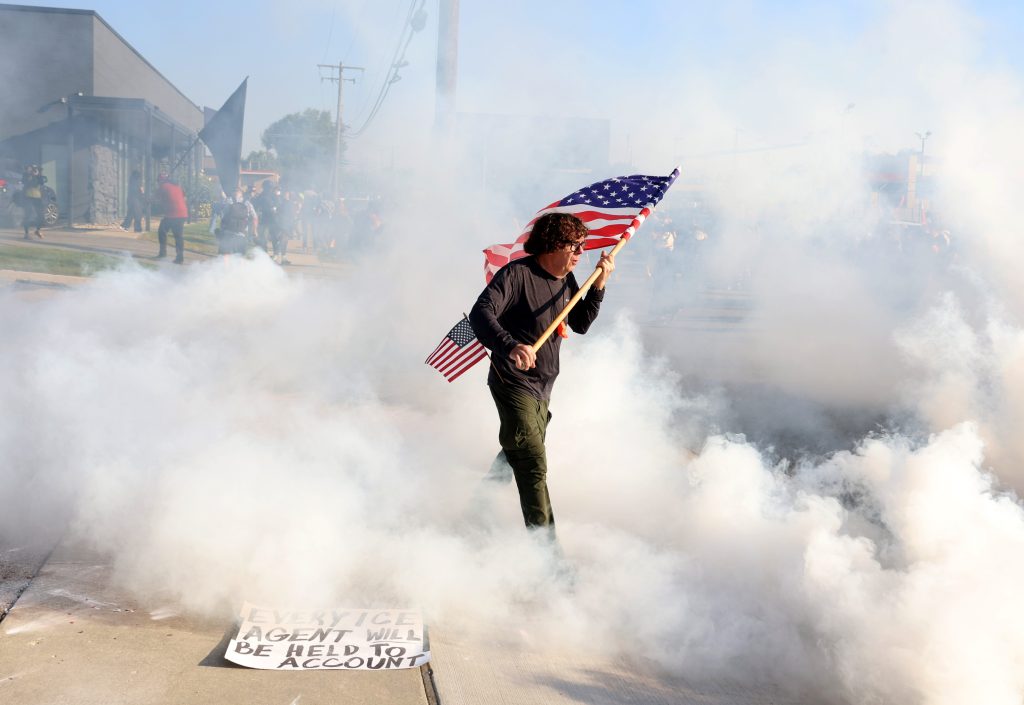DERRY, Northern Ireland — For the administration of President Donald Trump, here is a cautionary tale for sending troops into American cities: The Troubles, sectarian violence that increased with the deployment of British paratroopers into Northern Ireland’s second-largest city.
Those who grew up with MTV on their Toshiba wide-screens, or Sony Trinitrons in the 1980s, should be familiar with the battle over civil rights for Catholics in Ulster, the “six counties under John Bull’s tyranny” as Irish Republican songwriter Dominic Behan put it years before. That was after the 1921 partition which separated Ulster from the Irish Free State on the Emerald Isle following the Irish War of Independence.
A young Irish band U2’s “Sunday, Bloody Sunday,” video filmed live at the Red Rocks venue outside Denver, was on regular rotation on the cable channel in the early ‘80s. The band’s performance remains a powerful indictment of violence against civilians.
The song recounts the shooting of unarmed civil rights protesters in the Catholic-dominated Bogside area of Derry, or Londonderry, if you adhere to British rule, in 1972 by Paras. Twenty-six were shot; 14 mainly young people died as a result of the gunfire.
The stain of the Bloody Sunday massacre was revived last week in Derry as the trial began for the lone paratrooper so far charged with the murder of two peace marchers and attempted murders of others. It finally began more than 53 years after the deadly Jan. 30, 1972 protest when Catholics were in the minority. Today, they have a slight edge in population.
In an odd twist to British jurisprudence, the former member of the army’s elite Parachute Regiment — who by this time must be in his 70s — is not named except for being called Soldier F. He is kept secluded by a black curtain during the trial before a Belfast Crown Court judge, according to an account in The Irish Times, based in Dublin in the Irish Republic.
Families of those killed had worked for decades for justice for the victims whose civil disobedience campaign that day protested against the Ulster government’s discrimination against the Catholic population, jail terms without trial, unemployment and other economic issues. Annual commemorations for the victims ultimately got an apology from the British government in 2010.
Something similar to Bloody Sunday could easily happen if Trump decides to send the National Guard to Chicago, which is currently on edge over raids and street sweeps throughout the region by agents of the U.S. Immigration and Customs Enforcement. After all, the city has faced troops before during the Haymarket Riot, Pullman Strike and the 1968 Democratic National Convention.
Some may remember the shootings by National Guardsmen of students at Ohio’s Kent State University in May 1970 during Vietnam War demonstrations, along with those at Jackson State University in Mississippi. The current political divide is becoming increasingly worse than in those days of anti-war rage, where at least free speech was tolerated by President Richard Nixon and his toadies.
Or are troops going to Memphis, Tennessee, before they march into the Windy City? That was something the president offered after getting pushback from Illinois officials, including Gov. JB Pritzker and Chicago Mayor Brandon Johnson. Trump’s decision-making on the troop issue is as volatile as the gales that wash the breathtaking cliffs along Ireland’s wild Atlantic Way.
If those troops are headed toward Illinois, they most likely will be billeted at Naval Station Great Lakes or perhaps Fort Sheridan Reserve Center. Peaceful protesters from the Waukegan area marched outside the Navy base over the weekend, targeting the presence of ICE agents who are seeking undocumented immigrants across Chicagoland. The federal task force has been using the military installation as its headquarters.
The trial of the British paratrooper is another step toward reconciliation and maybe the reunification of one Ireland. Some who I talked to during a tour of Northern Ireland and the Irish Republic are optimistic, but not in their lifetimes.
I’m not so sure. The wounds of The Troubles, which saw British troops suffering more casualties than Irish Republican Army volunteers and Ulster Brigades, run deep in Northern Ireland, a country mired in misery for centuries.
Nationalists point to the Plantation of Ulster, a move by rich landowners and British government officials in the early 17th century to colonize Ulster with Presbyterians. They confiscated lands from the native Irish who were Catholic.
That ethnic conflict has continued over the centuries. Adding to that is the famine of the mid-1840s, which led to many leaving for America, when starving Irish were allowed to die of hunger.
This while foodstuffs continued to be exported to Britain and other locales of the Empire, the Irish will tell you. Folks in Ireland don’t forget the broad history behind their heritage.
The same could be said for what may happen if federal troops are sent to the Chicago region.
Charles Selle is a former News-Sun reporter, political editor and editor.
sellenews@gmail.com
X: @sellenews
Originally Published: September 22, 2025 at 10:49 AM CDT
